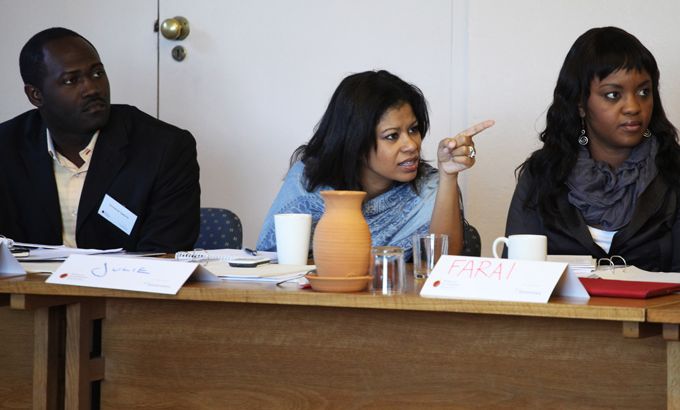
Episode 3: Getting to the heart of leadership
The 25 young Africans must prove that they can translate talk into real change.
After their retreat at Mont Fleur, South Africa, the young leaders headed for home feeling inspired.
It has been four months since they first met in Cape Town and the group is reuniting for the final part of their leadership coaching – this time at Oxford University’s business school in the UK.
The people we met, the chemistry of the group, the space we were given for introspection, I think it really created magic.
Now halfway through their leadership course, some are beginning to get into their stride. As a precondition of graduating as a Tutu Fellow, they have been given a homework assignment that will require them to turn talk into action. By the time they gather in Oxford they must have settled on a project, developed a business plan for it and started to involve stakeholders.
Most of the participants chose a project that draws on their childhood experiences and, from May to August, 25 social projects sprang up across the continent. But translating their ideas into reality will mean addressing taboos and facing their inner most conflicts. And that becomes the focus of the second workshop. While their meeting in Cape Town was all about examining tough African issues, in Oxford they are pushed to analyse themselves.
We have to teach our people that you can deliver a message without becoming a martyr.
As part of this, they are taught by British business guru Charles Hampden-Turner, the creator of dilemma theory. Dilemma theory holds that the key to success lies in embracing the very thing you find most uncomfortable. Now halfway through their leadership course, some are beginning to get into their stride. As a precondition of graduating as a Tutu Fellow, they have been given a homework assignment that will require them to turn talk into action. By the time they gather in Oxford they must have settled on a project, developed a business plan for it and started to involve stakeholders.
Most of the participants chose a project that draws on their childhood experiences and, from May to August, 25 social projects sprang up across the continent. But translating their ideas into reality will mean addressing taboos and facing their inner most conflicts. And that becomes the focus of the second workshop. While their meeting in Cape Town was all about examining tough African issues, in Oxford they are pushed to analyse themselves.
He presents the fellows with the example of Martin Luther King Jr. as the young African leaders discuss whether they would be prepared to risk their lives and what legacy they would like to leave.
Chat show host and fellowship participant Julie Gichuru uses the example of Nelson Mandela to illustrate her point about it being possible to be a great hero without becoming a martyr.
The objective of the leadership course is to push these young Africans out of their comfort zone. And the course participants have come with an appetite for inconvenient truths, ready to get to the heart of what leadership will really mean.
Archbishop Tutu’s Truth and Reconciliation Commission is held up internationally as a model of restorative justice and widely considered a saving grace of post-apartheid South Africa. But as the young leaders grapple with the sad reality that the ‘rainbow nation’ is struggling, hidden fault lines appear. For the six South Africans in the group, the new climate of polarisation brings back childhood memories of division.
But would an apology help heal these rifts?
”Black,
, if things don’t work out for me in South Africa then perhaps I should think about moving elsewhere, and it’s something that the continent can’t afford.”]
Company director and fellowship participant Ndumiso Luthuli explains that what pains him most is that a notion of white supremacy still exists in South Africa. He believes that nation-building, not forgiveness is the country’s most immediate requirement and struggles with the idea that forgiveness can be demanded and time frames placed upon it. “You don’t have to forgive to move on,” he says.
It may be the foundation stone of Tutu’s and Mandela’s Africa but it seems that for this generation forgiveness is not granted freely. And, although the debate goes on, a clean break from the past seems a liberating prospect for these young leaders.
But with their mixed heritage and educational backgrounds in Europe and the US, how representative are Tutu’s Children of their fellow countrymen and women? And does that really matter if they are prepared to become the change-makers their continent needs?